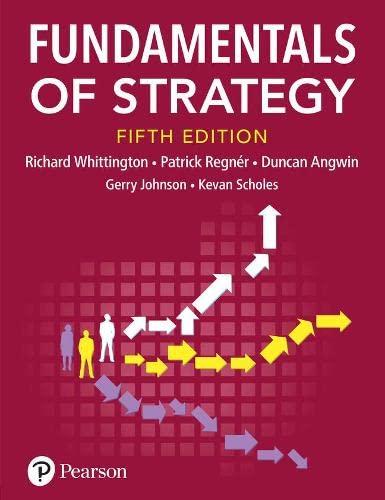2 In what respects did the University of Baths culture under Breakwell appear to diverge from that...
Question:
2 In what respects did the University of Bath’s culture under Breakwell appear to diverge from that outlined in the 2016–21 strategic plan and what could be done to reduce this apparent divergence? In 2018, Glynis Breakwell stepped down after 17 years as Vice Chancellor (chief executive) of the University of Bath.
For a new university situated outside any major city, the University of Bath had experienced remarkable success during Breakwell’s term of office. She had presided over a doubling in student numbers since her start in post. The University had achieved the highest possible ratings from the government’s teaching assessment system, it ranked among the top 12 universities for research in the United Kingdom, and overall it was rated as the country’s fifth-best university in the influential Guardian University 2018 guide. Yet Breakwell retired from her position surrounded in controversy.
The University’s motto is taken from the Latin poet Virgil:
‘Learn the culture proper to each after its kind.’ This is a message of respect. The University’s 2016–21 Strategic Plan reinforced this message by describing as one of its five key attributes: ‘A supportive culture: creating a welcoming, inclusive community that values the individual and supports the realisation of their potential.’ However, by the last year of Breakwell’s tenure, one of the University’s trade union leaders was accusing her of creating a ‘culture of fear’.
Breakwell had been well rewarded for the university’s successes. Breakwell’s total package increased from
£349,000 in 2011 to £451,000 in 2016, a proportional rise far ahead of that of most of her staff. Another pay rise followed in 2015–16, taking Breakwell’s pay to the highest among British universities, more than £450,000. The number of other staff paid more than £100,000 in the University rose from just two when Breakwell took over to more than 50 by 2014. The University had also bought a prestigious mansion in the centre of Bath as living accommodation for Breakwell.
At the same time, Breakwell kept a tight grip on other labour costs. Breakwell had always refused to negotiate with local trade unions and non-academic pay lagged other local employers. For academics, the university had become one of the country’s leaders in the use of zero-hours contracts, by which staff were hired by the hour, often at short notice. Many postgraduate teachers were stuck on the very lowest pay grade on the national scale and – unlike at other universities – were unable to progress higher.
In 2017, Breakwell was awarded another large pay increase by a committee on which she herself sat and voted.
Protests among students and both academic and non-academic staff broke out. A senior member of the University complained: ‘[Breakwell] represents an idea of the university as “business” that most of us do not share.’ Newspapers and politicians denounced Breakwell’s pay and four Members of Parliament resigned from the University’s advisory board.
Among the controversy, student applications for entry to Bath in 2018 fell by nearly 6 per cent, while competitor universities were expanding. Breakwell was obliged to promise her retirement at the end of the academic year.
Step by Step Answer:

Fundamentals Of Strategy
ISBN: 9781292351377
5th Edition
Authors: Richard Whittington, Patrick Regner, Duncan Angwin, Gerry Johnson, Kevan Scholes





